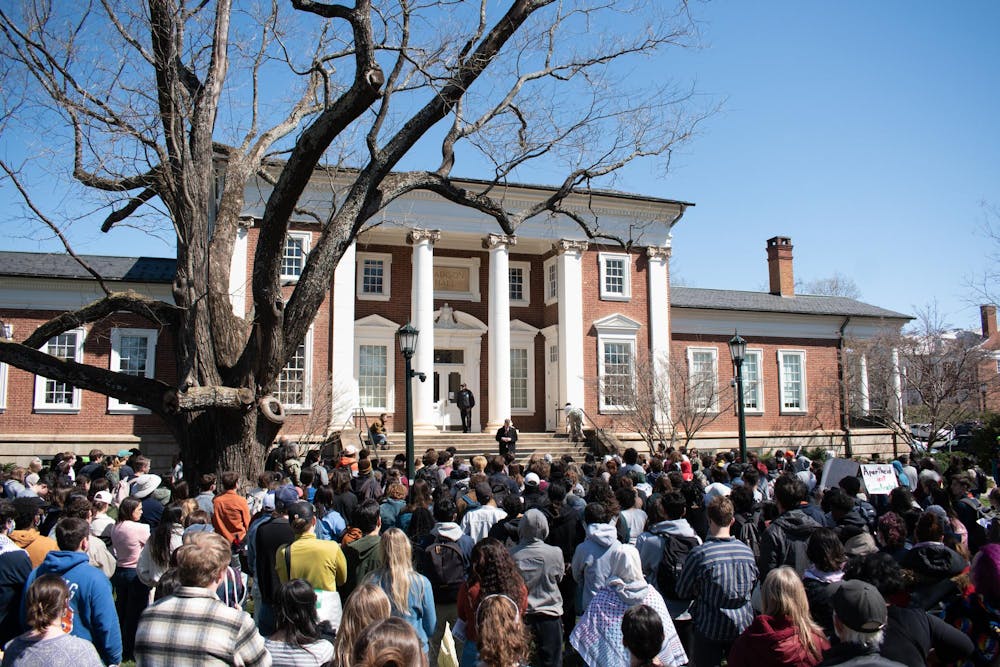The University received a letter from the U.S. Department of Education’s Office for Civil Rights March 10 accusing it of failing to protect Jewish students on Grounds. The letter warns that the University should expect sanctions from the Trump administration, unless they take the responsibility for protecting their Jewish students seriously. Two years ago, after a sign at the University’s Chabad house was vandalized, I levied a similar accusation against the University. But the recent federal focus on antisemitism is no cause for celebration. Rather, the Trump administration is weaponizing antisemitism in order to attack the University’s values and promote academic censorship.
If all you knew about American universities was what you heard from President Donald Trump’s Truth Social account, you would come to think of them as hotbeds of antisemitism. Yet, this is not the reality at our University. Just last year, the Jewish Leadership Advisory Board wrote in a letter to the Board of Visitors that Jewish students “...feel supported by the University’s administration in issues surrounding Jewish students around Grounds.” It is important to note that JLAB does not speak for all Jewish students. There are, of course, still instances of antisemitism at the University, but student opinions like these suggest that antisemitism is the exception, not the rule.
In addition to leveling a largely unfounded accusation at the University, the letter is ambiguous on what sanctions would actually look like. Luckily for us, Trump’s recent actions — against Columbia University in particular — offer a playbook of what is to come for the other 59 schools on the list, the University included. In March, the Trump administration informed Columbia that $400 million of federal funding would be withheld and communicated a list of demands, with the implicit promise that if Columbia gave in, the two parties could begin a discussion about returning the withheld funds. Columbia was an obvious first target for the Trump presidency — since the outbreak of the war in Gaza, Columbia has been the epicenter of student activism, coming to a head with students occupying the central campus building of Hamilton Hall. Facing what faculty characterized as a “gun to the head,” Columbia caved to the Trump demands.
While the Trump administration initiated these actions against Columbia in response to reports of antisemitism on campus, the Trump administration’s nine demands do little to address antisemitism. Most notable were the demands targeting the university’s academics. Columbia’s Middle East, South Asian and African Studies department took the brunt of the attack. The department was forced to hire a new provost and was put under “academic receivership.” Like many things in the Trump administration, it is unclear what is meant by this. Academic receivership is typically an internal process that occurs when a college administration determines that a particular department is in dire need of outside oversight. In this case, however, the Trump administration itself — as opposed to Columbia — is asking for direct oversight into the happenings of the department, something which treads dangerously close to violating academic freedom.
Should Trump choose to target our University, two similar departments would be at risk of academic censorship — Middle East and South Asian Languages and Cultures and African American and African Studies. It is unclear how censoring these departments has anything to do with preventing antisemitism on college campuses. At the University, these departments offer courses in Arabic, Persian, Hindi and other global languages and courses which explore the cultural and historical landscapes of the Islamic, South Asian and African world. What about this focus on studying various regions of the world threatens the safety of Jewish students? Given the tenuous connection to battling antisemitism, we are left to assume that the Trump administration is actually interested in censoring a certain set of departments which promote multiculturalism and global literacy.
Admittedly, other demands from the Trump administration were more focused on issues related to antisemitism — but still impede the openness for debate which universities must intrinsically promote. For example, the Trump administration demanded that Columbia accept a formalized definition of antisemitism, one that recognized anti-Zionism as a form of antisemitism. Reasonable people can disagree about whether or not anti-Zionism equates to antisemitism. In fact, it is an open question being debated in academic and faith communities around the world. Regardless of where your beliefs lie, this is an issue that should be debated at the colleges and universities that it directly affects — not an issue which is concretely and deterministically resolved from the man in the high castle. By offering this decree, the Trump administration stifles a debate that remains lively and unsettled, depriving students of the opportunity to engage in the meaningful discourse that leads to a deeper cross-cultural understanding.
The actions by the Trump administration are not merely attacks on one department or one aspect of University life — they are aimed at the very values of our institutions of higher education, values which include academic freedom, an openness to global perspectives and lively debate. Of course, attacking values is not uncharted territory for Trump. After all, not long ago diversity was one of our touted values. Perhaps attempting to replicate his success with DEI, Trump has set his sights on the academic freedom that is meant to define this University.
Whether it realizes it or not, our University is already in a dilemma — either willingly conform to the Trump administration’s image of education or resist. As such, the University must prepare now. And that preparation begins with the acknowledgment of a simple truth — the Trump administration’s actions have nothing to do with antisemitism and everything to do with our values.
Dan Freed is a senior opinion columnist for The Cavalier Daily. He can be reached at opinion@cavalierdaily.com.
The opinions expressed in this column are not necessarily those of The Cavalier Daily. Columns represent the views of the authors alone.







